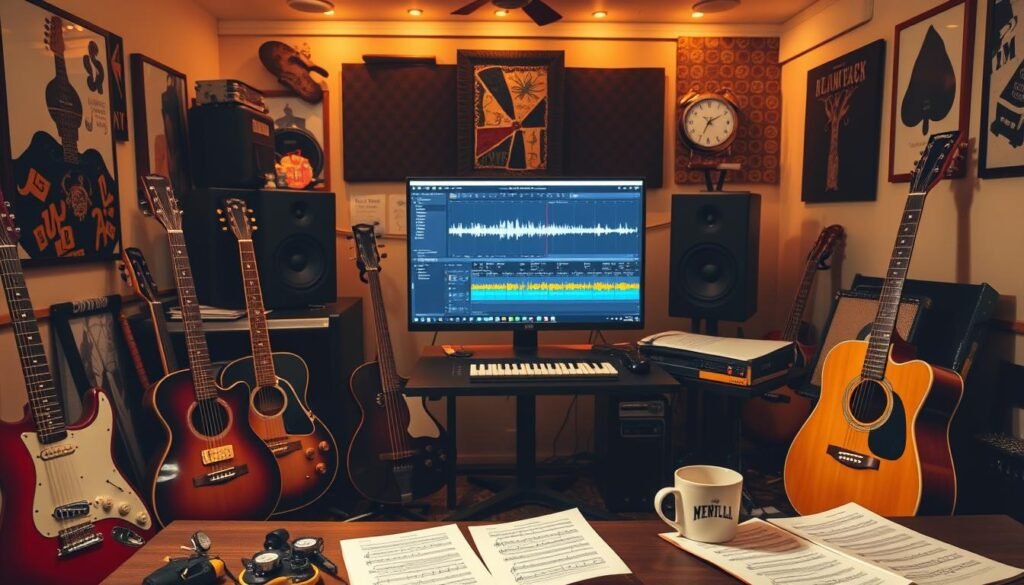How To Write Music is an art that moves us, tells stories, and connects us deeply. It doesn’t matter if you’re experienced or just starting. Learning music composition basics can unlock your creative potential. This guide will walk you through the steps to write your own music, from getting inspired to finishing your song.
Also Read: Top Benefits Of Music Education For Kids: Why Every Child Should Learn Music
Key Takeaways
- Discover how to tap into your creativity and find inspiration for your musical compositions.
- Learn the importance of choosing the right genre and style to align with your artistic vision.
- Understand the essential elements of music, such as chord progressions and melody writing, to craft captivating pieces.
- Explore strategies for refining and finalizing your song, ensuring it resonates with your audience.
- Gain insights into the music theory concepts that can help you write more sophisticated and meaningful music.
Getting Started with Music Composition
Starting to make your own music begins with finding inspiration. As songwriters and composers, we can get ideas from many places – like our own lives, feelings, books, movies, or nature. Always carry a notebook to write down any songwriting ideas that pop into your head. After you have a clear idea, look into different music genres and musical styles that fit your vision.
Also Read: Top Music Streaming Services Of 2024: Which One Is Right For You?
Finding Your Inspiration
Your music should show who you are and how you feel. Think about what you want to express – your experiences, memories, or emotions. Or, find inspiration from the world – the things that touch your heart. Using real sources of inspiration helps you make music that touches others too.
Choosing Your Genre and Style
With your inspiration ready, check out the music genres and musical styles for your song. The genre you pick, like pop or rock, affects your chord progressions and the feel of your song. The style you choose, whether fast or slow, shapes your melody writing and the mood of your music. Try out different chords and melodies to find the genre and style that match your vision.
Also Read: Music Theory Basics: A Beginner’s Guide To Understanding Music
“Music is the universal language of mankind.” – Henry Wadsworth Longfellow
Crafting the Essential Elements

Starting your music composition journey means learning the key musical elements. These include melody, harmony, and rhythm. They’re the main parts that make music memorable and touching. Improving in these areas will boost your songwriting techniques and make your music connect with people.
Developing a Captivating Melody
The melody is the core of your song, carrying its emotional depth. Try out different melodic development ideas like changing pitches and rhythms. Aim for a melody that sticks in people’s heads and moves them deeply.
Also Read: How To Set Up A Home Music Studio?
Harmonizing Your Creation
Your song’s harmonic structure supports its melody. Play with chord progressions, mixing major and minor sounds. Use inversions and voicings to deepen your harmony. A rich harmonic base can make your music stand out and engage your listeners.
Establishing a Driving Rhythm
Your song’s rhythm is its driving force. Try out various rhythmic patterns and time signatures to match your music’s style. Add syncopation and polyrhythms to spice up your rhythm. This makes your music more exciting and dynamic.
Mastering the basics of musical elements like melody, harmony, and rhythm is key. Keep experimenting and let your creativity lead. This way, you’ll make music that truly speaks to your audience.
How To Write Music

Developing a Chord Progression
Writing music starts with the chord progression. The chords you pick and how you arrange them shape the mood and feel of your song. Begin by trying out different chord combinations that fit your song’s genre and style.
Also Read: Music Copyright Rules For Artists: A Guide
Think about how the chords and melody work together. Using modulations or key changes can add depth to your song. Learning to create great chord progressions is key to making music that grabs listeners.
Crafting the Melody
The melody is vital in music composition, often leaving a lasting impression on listeners. When writing your melody, aim for phrases that are catchy and expressive.
Pay attention to the melody’s shape, using both high and low notes for depth. Try out various rhythms and phrasing to match your song’s mood and style. The melody should blend well with the chord progression for a smooth musical experience.
| Element | Importance | Considerations |
|---|---|---|
| Chord Progressions | Crucial for establishing mood, emotion, and overall feel of the composition |
|
| Melody | Essential for conveying the emotional core of the song and creating a memorable listening experience |
|
“The melody is the soul of a song, the chord progression is the body, and the rhythm is the heartbeat.”
Polishing and Finalizing Your Song

After you’ve built the key parts of your song, it’s time to make it shine. This means improving the lyrics, adjusting the chords or melody, and trying out various musical arrangements and instrumentation. By refining your song, you can make a piece that truly shows your artistic side.
Focus on the song’s structure and flow as you polish it. Make sure every part, from verses to choruses and bridges, has a clear role. Recording a demo can help you spot areas that need more work.
The creative process of song editing and musical arrangement is key to improving your song. Try out different instruments, rhythms, and harmonies to make your song stand out. Don’t hesitate to explore new ideas and take risks to make your song the best it can be.
Putting in the effort to polish your song will help you create something unforgettable. Remember, the details and dedication you put into it are what make a song stand out. This is what turns great songs into unforgettable ones.
Conclusion
Music composition is a rewarding journey that lets you share your artistic vision with the world. It connects you with others through sound. This guide has given you the skills to write music that moves people.
If you’re a musician, or just starting, remember that music composition is a lifelong journey. It’s full of chances to grow, try new things, and find yourself. Keep improving, explore different styles, and always look for inspiration. With hard work and love, you can make music that touches people’s hearts and minds.
Music isn’t just about technical skills. It’s a way to share your unique voice and vision. Trust your instincts and let your music reflect who you are. Doing this will not only improve your music but also add to the world’s rich musical heritage.
FAQs
Q: How can I start to write a song?
A: To start to write a song, it’s important to gather your ideas and define the mood you’re aiming for. You could write lyrics based on personal experiences or emotions. If you play an instrument, use it to create the music that complements your lyrics.
Q: What are the essential elements of songwriting?
A: The essential elements of songwriting include song structure, melody, and lyrics. A good song often has an engaging hook for your song that captures the listener’s attention. It’s also vital to consider the rhythm and flow of your lyrics and how they fit with the music you want to create.
Q: Do I need to play an instrument to write a song?
A: No, you don’t need to play an instrument to write a song. Many songwriters compose music using music software like GarageBand or by collaborating with musicians who can play instruments. If you’d like, you can focus on writing lyrics and melodies first.
Q: How important is song structure in writing songs?
A: Song structure is very important in writing songs, as it provides a framework for your ideas. Common structures include verses, choruses, and bridges. Understanding the structure can help you organize your thoughts and create a cohesive piece of music.
Q: What should I do if I want to write catchy lyrics?
A: To write catchy lyrics, focus on creating a strong hook and use rhyme to enhance the lyrical flow. Think about the message you want to convey and use relatable themes. Experiment with different phrases until you find something that resonates well with your intended audience.
Q: Can I learn songwriting techniques at Berklee College of Music?
A: Yes, Berklee College of Music offers various courses on songwriting and music composition. Students can learn step-by-step techniques for writing lyrics, melodies, and understanding the music business, which can be invaluable for a music career.
Q: How do I know if my song is good?
A: To determine if your song is good, share it with trusted friends or fellow musicians and seek constructive feedback. Additionally, listen to your song critically and consider how it makes you feel compared to hit songs in your genre.
Q: What is the best way to record your song?
A: The best way to record your song is to use quality music software that suits your needs, such as GarageBand or other digital audio workstations. Ensure you have the right equipment, like a good microphone, and set up a quiet recording space to capture your performance clearly.
Q: How can I find inspiration to write new music?
A: Inspiration for writing new music can come from various sources including personal experiences, nature, art, or even other songs. Try to immerse yourself in different environments, collaborate with other musicians, or simply spend time exploring different genres of music to spark your creativity.
Source Links
- https://songtown.com/on-songwriting/how-to-write-a-song/
- https://www.artofcomposing.com/how-to-compose-music-101
- https://www.careersinmusic.com/how-to-write-a-song/




